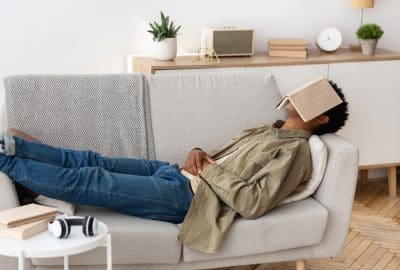You’ve been looking forward to this moment all week. The deadlines are met, the kids are asleep, the phone is on silent, and you’ve finally sunk into that couch with absolutely nothing demanding your attention. Perfect relaxation at last—except suddenly your heart is racing, your mind is spinning with forgotten tasks, and an inexplicable sense of dread is creeping up your spine. What gives?
The paradoxical panic
If you’ve ever felt a surge of anxiety precisely when you’re supposed to be relaxing, you’re experiencing what psychologists recognize as a common but rarely discussed phenomenon. This paradoxical response—feeling anxious when finally given the chance to relax—isn’t just annoying, it’s a recognized pattern that affects millions of people.
The scenario plays out in countless variations. Maybe it’s the vacation anxiety that hits as soon as you arrive at your destination. Perhaps it’s the Sunday scaries that transform your weekend’s final hours into a stress festival. Or it could be the mysterious insomnia that appears only when you have no reason to wake up early the next morning.
This relaxation-induced anxiety isn’t a personal failing or proof that you’re somehow “doing relaxation wrong.” It’s a predictable response rooted in both your brain’s wiring and your life experiences—and understanding why it happens is the first step toward actually enjoying your hard-earned downtime.
The productivity prison
For many people, the anxiety that crashes their relaxation parties stems from a complex relationship with productivity. In a culture that often equates worth with output, the very act of relaxing can trigger feelings of guilt, worthlessness, or impending failure.
This productivity attachment runs deeper than just conscious thoughts about work. Many of us have internalized the message that our value comes from what we accomplish, not who we are. When we stop accomplishing things, even temporarily, an uncomfortable identity gap opens up, and anxiety rushes in to fill it.
The mental math becomes subconsciously simple: If I’m not being productive, I’m failing. If I’m failing, I’m at risk. If I’m at risk, I should feel anxious. Your brain, trying to protect you from perceived danger, helpfully supplies the anxiety it thinks you need to get back on track.
The hypervigilance habit
For others, relaxation anxiety stems from a chronically hypervigilant nervous system that’s forgotten how to downshift. If you’ve spent months or years in high-stress environments—demanding jobs, challenging relationships, financial uncertainty, or health crises—your nervous system adapts by staying constantly alert.
This vigilance becomes your baseline, your normal operating state. When you suddenly remove the stressors and try to relax, it doesn’t feel like relief—it feels like letting your guard down in potentially dangerous territory. Your brain, accustomed to scanning for threats, doesn’t know what to do with the sudden lack of problems to solve.
The resulting anxiety is essentially your nervous system saying, “Wait, this doesn’t feel right. Something must be wrong. Let me find the danger.” It then helpfully manufactures worry thoughts to justify the uncomfortable feeling of relaxation.
The control conundrum
Control plays a fascinating role in relaxation anxiety. Many high-functioning anxious people maintain their equilibrium through carefully controlled schedules, environments, and behaviors. This control creates a sense of safety and predictability that keeps anxiety at bay during productive periods.
The act of relaxing inherently involves surrendering control—letting go of schedules, releasing expectations, and allowing unstructured time to unfold naturally. For the control-oriented mind, this surrender feels deeply threatening rather than relieving.
This explains why “forced relaxation” activities can sometimes increase anxiety rather than reduce it. Being told to “just relax” on someone else’s schedule or in prescribed ways can feel like losing control of even your downtime, triggering the very anxiety you’re trying to escape.
The emotional backlog
Perhaps the most interesting cause of relaxation anxiety is what therapists sometimes call “stored emotions.” During busy, stressful periods, you likely push uncomfortable feelings aside to get through what needs doing. You don’t have time to process that argument, grieve that disappointment, or address that nagging worry—so you compartmentalize.
When you finally slow down, all those stored emotions see their opportunity to finally be felt. Your mind, no longer distracted by tasks and demands, naturally begins to process this emotional backlog. What you experience as “relaxation anxiety” might actually be the emergence of deferred emotional work.
This explains why people often find themselves unexpectedly crying during massages, yoga classes, or the first days of vacation. The body recognizes a safe opportunity to release what’s been stored, but the conscious mind experiences this release as unwelcome anxiety or emotional disruption.
The rewiring remedy
Overcoming relaxation anxiety starts with rewiring how your brain interprets the physical sensations of relaxation. Many people have spent so long in a stress state that the physical feelings of relaxation—slowed heart rate, relaxed muscles, deeper breathing—have become foreign and therefore threatening.
Start with brief, regular periods of intentional relaxation rather than waiting for occasional big blocks of downtime. Daily five-minute sessions of deep breathing or progressive muscle relaxation help your nervous system recognize and welcome the physical sensations of relaxation rather than interpreting them as dangerous.
Consistency matters more than duration here. Your brain learns through repeated exposure that relaxed physical states are safe, gradually reducing the automatic anxiety response that’s been hijacking your downtime.
The value reframe
For those trapped in productivity-based identity, developing a new relationship with rest becomes essential. This means consciously challenging the belief that your worth comes from your output, and instead embracing rest as a crucial part of a well-lived life.
Try creating a concrete list of non-productivity values that matter to you—presence, creativity, connection, health—and notice how proper rest actually enhances your ability to live according to these values. This shifts rest from an indulgence or waste to an essential practice aligned with your deeper priorities.
Some find it helpful to literally schedule relaxation, treating it with the same importance as work meetings or family obligations. This bridges the gap between productivity mindset and relaxation needs, allowing your brain to categorize rest as “on-task” rather than “off-track.”
The mindful approach
Mindfulness offers particularly powerful tools for navigating relaxation anxiety. When anxiety arises during downtime, try observing it with curiosity rather than frustration. Notice the physical sensations, the thoughts that arise, and the urge to return to busyness or worry.
This observational stance creates a crucial separation between you and the anxiety. Rather than being swept away by it or fighting against it, you’re simply noticing it as an interesting phenomenon. This perspective shift often reduces anxiety’s intensity and breaks its ability to hijack your relaxation.
The mindful approach acknowledges a fundamental truth about relaxation anxiety: fighting against it paradoxically strengthens it. Accepting the anxiety’s presence while continuing to rest anyway gradually teaches your brain that both can coexist, reducing the alarm response over time.
The titration technique
For those with particularly persistent relaxation anxiety, a gradual approach works better than diving into the deep end of leisure. Titration—systematically increasing exposure to relaxation while managing overwhelm—helps nervous systems acclimate more successfully.
This might mean starting with “active relaxation” like walking in nature, gentle stretching, or creative hobbies that keep your hands busy while allowing your mind to unwind. These activities provide enough structure and stimulation to feel safe while still promoting relaxation.
As your comfort increases, gradually introduce more traditional relaxation experiences in small doses, perhaps starting with five minutes of meditation or twenty minutes of unstructured time. This step-by-step approach prevents the overwhelm that can turn relaxation into an anxiety trigger.
The physical foundation
Sometimes relaxation anxiety has physical contributors worth addressing. Caffeine, alcohol, blood sugar fluctuations, and even certain nutrient deficiencies can create physical sensations easily mistaken for anxiety, especially when you’re finally sitting still enough to notice them.
Try experimenting with reducing caffeine intake, especially in the hours before periods when you want to relax. Similarly, notice whether alcohol, while seeming to promote relaxation initially, might be contributing to rebound anxiety during downtime.
Regular physical activity—particularly rhythmic, moderate exercise like walking, swimming, or cycling—helps regulate the nervous system’s ability to transition between active and relaxed states. Many find that consistent movement throughout the week dramatically reduces their relaxation anxiety on weekends or vacations.
The social permission
For many people, relaxation anxiety diminishes significantly when rest comes with social permission or shared experience. This explains why it’s often easier to relax during an approved vacation than a random Wednesday afternoon, even when both offer the same freedom from obligations.
Create relaxation accountability by planning downtime with others who share your challenges with rest. This might mean a regular “do nothing” date with a partner, a meditation group, or even an agreement with a friend to text each other when you’re taking intentional breaks.
Some find it helpful to literally write themselves a “permission slip” for rest, particularly when relaxation anxiety carries heavy notes of guilt or unworthiness. This external validation, even when self-generated, can help bridge the gap between knowing you deserve rest and feeling allowed to take it.
The success markers
As you work to overcome relaxation anxiety, it’s important to recognize that progress often looks different than expected. Success isn’t never feeling anxious during downtime—it’s developing a new relationship with the anxiety when it appears.
Watch for subtle signs of improvement: perhaps you still feel anxious when trying to relax, but you recover more quickly. Maybe the anxiety is less intense or affects your body differently. Perhaps you’re becoming more skilled at continuing to rest even when anxiety appears rather than immediately returning to productivity.
These incremental changes matter. Relaxation is a skill—particularly for those whose nervous systems have adapted to chronic stress—and like any skill, it develops through practice, patience, and celebrating small victories along the way.
By understanding why your brain seems determined to sabotage your downtime, you gain the insights needed to finally relax without the unwelcome anxiety tag-along. Your nervous system is designed for both productivity and rest—and with the right approach, you can reclaim your ability to truly enjoy the downtime you’ve earned.













